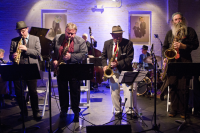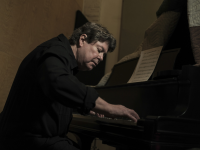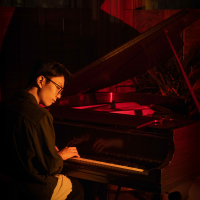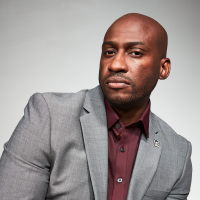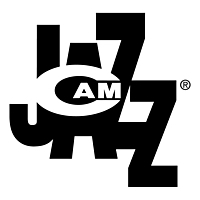Spike Wilner has spent a good chunk of his life fronting the piano at Smalls, at its first incarnation as the wildly popular BYOB that Mitch Borden created in the ‘90s and during the less storied but still musically vibrant era of the last couple of years.
Now, ensconced in a tiny pocket of an office tucked into the back of the premises at 183 West 10th Street, he’s talking about his plans for the legendary Greenwich Village club, which he has just acquired with a partner, Lee Kostrinsky, an old friend. He and Kostrinsky promise to bring Smalls back to the
play-hard (in terms of fun and music), live-loose vibe of its glory days while ensuring, hopefully, its staying power into the future. Not easy in post-9/11 NYC.
“The old Smalls was a kind of a crazy
freewheeling place, a raw space. There was a $10 cover charge and you brought your own beer. It was packed night after night because it was a cheap place to just come and hang out and musicians played all night,” explains Wilner, a New School jazz grad who made a well-regarded recording of those days called Late Night: Live at Smalls (Fresh Sound-New Talent, 2004).
Even from behind closed doors you can hear the music emanating from out front, a fitting reminder of what Smalls past and present is truly about. This night it’s the warm rich tenor sound of saxophonist Grant Stewart and his drummer brother Phil, a
versatile player who also performs with Kostrinsky in a rock band with New York Dolls guitarist Steve Conte. (Pianist Ehud Asherie, guitarist Joe Cohn and bassist Joel Forbes are along for the ride.)
“It was really an amazing thing and it lasted a long time, but basically on the back of Mitch,” says Wilner of Borden, who ran his BYOB “virtually alone, doing everything himself.” Then he went bankrupt because of skyrocketing rent and a policy that didn’t require clients to buy anything in the club - with no bar inside there was nothing to buy. “Originally it was affordable and then it became impossible.”
When Borden closed Smalls, he reapplied his seemingly inexhaustible efforts toward a new venture bringing live jazz to the nearby pool hall Fat Cat [now in limbo]. A Brazilian bar owner who had snapped up Smalls’ lease and tried opening a bar on the site gave up and asked him to come back, this time as manager of a reopened Smalls, where he would run the music. That was Smalls, Chapter 2.
Not an era the new musician owners wish to
emulate. It’s the old spirit of that pre-Brazilian Smalls that they want to recapture. “We want to create an environment where people can come, enjoy
themselves,” says Wilner. “Listen to good music, have good drinks, meet their friends. You know…”. Kostrinsky, finishing his sentence: “Relax… And no pressure from waitresses.”
Wilner: “But we would like to pay the bills and if anyone would like to give us a donation of cash gifts or if any wealthy patrons would like to write a check...” That means the $20 admission cover that
materialized during the Brazilian era the last couple of years will stick. The fee includes a “gambling chip” applicable toward a drink worth $10, a modest charge for a policy that allows you to stay until the club’s
closing unlike at many other places.
What probably won’t change much is the cozy atmosphere within the club. It’s a tight box of sound that promotes intimacy between listener and players, who, depending on where you chose to sit, can be just a couple of feet away from you, on a platform that is only slightly raised from the ground. You can be so close you feel like you could be in your living room - or even in the band. It’s a wood-beamed, brick-walled room softened by rugs and curtains with dim lighting accentuated by candles. Chairs more comfortable than some of the thrift-shop hand-me-downs now scattered about are a goal. But will any of that eclectic look
survive? That’s a wait and see. What’s certain is that the new “old Smalls” benefits from expensive
renovations the previous owner Jose Farias de Couto did - structural rehab to the premises, handsome bar, AC system, modern bathrooms and generally
cleaned-up interior. (Wilner says they’ll be getting a new sound system to make things even better).
What has changed are the hours of sets and some reshuffling of performers. The main acts are now early, from about 8:30 pm to midnight to
accommodate working people who can’t stay out so late on weeknights. A late show with a second band occupies the stage from midnight until closing,
perhaps until 4 am on weekends. The idea is to
revitalize an after-hours scene and keep the bar and music going as long as there are people hanging out.
The plan is to have the doors open with a “happy hour” from about 6:30 pm to possibly 8 pm nightly,
accompanied by solo piano (don’t be surprised to see Wilner at it). He also says they’ll be asking some of the club’s well-known alumni to come back and play. The excellence Borden fostered there distinguished the club as a go-to place for jazz. Brad Mehldau, Kurt Rosenwinkel, Brian Blade, Joshua Redman, Sam Yahel, Mark Turner, Jason Lindner, Omer Avital, Larry Goldings and Peter Bernstein are just a few examples. By the way, while some things have changed in a big way - Wilner in the office, Kostrinsky behind the bar
tutoring young bartenders in the new Smalls way - Borden is still at the door and the new owner says he will continue to book musicians.
What patrons won’t see are those little placards existent in some other clubs suggesting or demanding that they keep their lips zipped while the music is being played. People are allowed to talk, in this club. Socializing is in. “You don’t want to play for the most raucous crowd in the world but this is people’s music and it always has been,” says bassist Ari Roland. “There’s never been any great jazz made, except in very rare circumstances, in a concert hall ... I think it’s a very positive thing that it’s not a church in here.”
spike@spikewilner.com
Luke@smallsrecords.com
webmaster@smallsjazz.com
ned@nedgoold.com
cbmusic72@verizon.net
merlinco@worldnet.att.net
anders@wommusic.com
->
show less
 183 West 10th Street
183 West 10th Street



